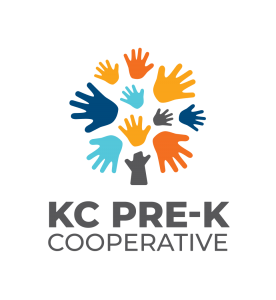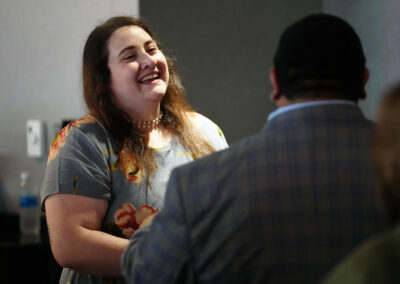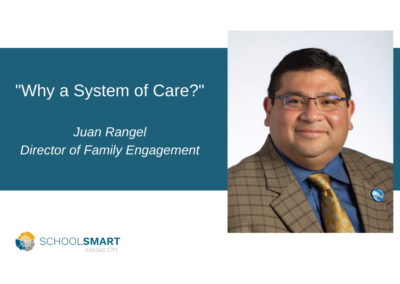
By Rebecca Williams
Celebrating the Kansas City Pre-K Cooperative
The COVID-19 pandemic, and a newly heightened awareness of racial injustices in our country, has amplified the disproportionate impact our systems have on different populations. When it comes to early childhood education, the contrast is stark – but completely fixable. A new special report from the National Institute for Early Education Research illuminates the disproportionate impact a lack of pre-K has on Black children. The report finds that “one year of universal high-quality pre-K could practically eliminate the Black-White reading skills gap at kindergarten entry—from nearly seven months to almost zero—and cut the math skills gap almost in half—from about nine months to five months.”
Analysis informing the design of the Pre-K Cooperative found similar gaps in access to high-quality programs in Kansas City. According to census data, approximately 46 percent of young children in Kansas City are living in poverty. Even before the pandemic, there were not enough free seats for all the children who need them and those that exist are not evenly distributed by geography, making it hard for low-income Kansas City families to attend if they can find a spot. The COVID-19 pandemic has drastically impacted early education budgets and shrunk capacity, making access even more of a challenge.
In 2018, SchoolSmartKC, in collaboration with other education partners, started a conversation focused on bringing together early education centers and K-12 public schools to leverage their shared resources to provide free, high-quality pre-K education programs to families that live within the boundaries of the Kansas City Missouri Public School District, and the Kansas City Pre-K Cooperative was launched.
Accessing Funding to Serve KC Pre-K Students
Collaboration between K-12 schools and pre-K providers offered solutions to the challenges participating partners faced in launching or expanding programs on their own. Pre-K providers offered classroom space and expertise in early learning and child development. Public K-12 schools had access to existing, but underutilized public funding for pre-K. Under HB 1689 passed in 2014, public school districts are eligible for funding equal to four percent of their total enrollment.
“The passage of HB 1689 marked the first time state funding has been made available through the state funding formula for pre-K, but schools weren’t able to fully tap that resource before partnering with childhood providers,” Anne Miller, Coordinator of the Cooperative explained. “By connecting schools to experienced early childhood centers that were already serving local families, the Cooperative will be able to deploy close to $2 million in state funding next year that would have otherwise been left on the table.”
The program launched in the fall of 2019 with three early education partners – Emmanuel Child and Family Development Center, Operation Breakthrough, and United Inner City Services (UICS) – and six school partners – Citizen of the World Charter Schools, Crossroads Academy, Genesis School, Hogan Preparatory Academy, KIPP:KC , and University Academy. Together they served 120 students in seven classrooms in the Cooperative’s first year. In addition to creating new pre-K seats, the founding partners also set a shared high bar for program quality. Working in partnership, they aligned on curriculum, assessments and quality standards, building consistency in the early childhood field and a more consistent educational experience for students as they move from pre-K to Kindergarten and beyond.
“Joining the Pre-K Cooperative and partnering with UICS allowed us to open pre-K classrooms this school year and feel confident that the program we are offering our students provided them a solid educational foundation because UICS has a strong 50-year track record of serving KC families,” said Tony Kline, Superintendent at University Academy. “We’re looking forward to continuing our partnership next year.”
For the leaders of the early childhood centers, the partnership brings the ability to extend their work and support their mission in serving as many students as possible:
“There are always more parents seeking pre-K for their children than we are able to serve,” said Deidre Anderson, Chief Executive Officer of UICS. “Working together with Citizens of the World, Crossroads Academy, KIPP:KC, and University Academy, we have been able to add pre-K state aid reimbursement to our funding streams and serve 70 Pre-K Cooperative students this year.”
Building a Platform for Success: The Future of Pre-K Education in Kansas City
Word of early success of the Kansas City Pre-K Cooperative spread quickly and for the 2020-2021 school year the Cooperative is expanding to include a total of five early childhood partners and 12 K-12 partners, including Kansas City Public Schools. The Cooperative is poised to leverage $2 million in state funding to serve 235 students in 14 classrooms. This level of collaboration across the early childhood and K-12 sectors in Kansas City is groundbreaking and serves as a model for even greater continuity, sustainability, and program quality in education, benefiting generations of students to come.
“We will have four Cooperative classrooms next year serving 78 students,” said Mary Esselman, President and CEO of Operation Breakthrough. “Increasing our capacity to serve pre-K students fuels our mission to educate children and ensure they enter school ready and empower their families.”
One of Operation Breakthrough’s partners next year will be Kansas City Public Schools (KCPS). In addition, KCPS will also partner with Emmanuel Child and Family Development Center. Julia Wendt, KCPS Officer of Early Learning said, “KCPS has been committed to increasing access to pre-K in our community for several years. We value the opportunity to partner with Operation Breakthrough and Emmanuel Family & Child Development Center for the 2020-2021 school year to pilot an innovative and collaborative approach to serve Kansas City’s youngest students.”
Opportunities with the Kansas City Pre-K Cooperative
To learn more about the Kansas City Pre-K Cooperative, visit: https://kcprekcooperative.org/
For job opportunities, including educator roles, visit: https://kcprekcooperative.org/news



